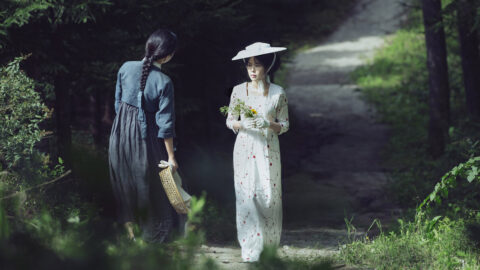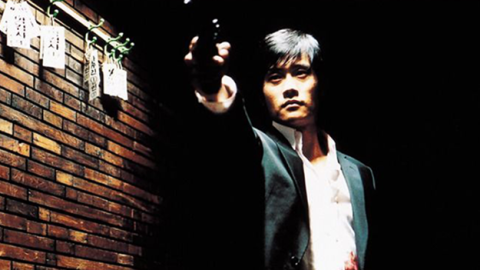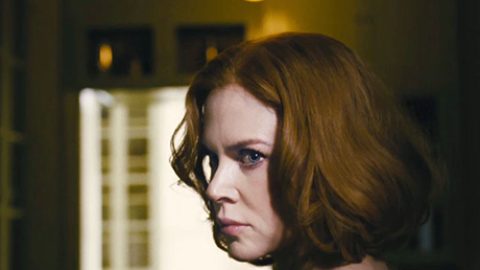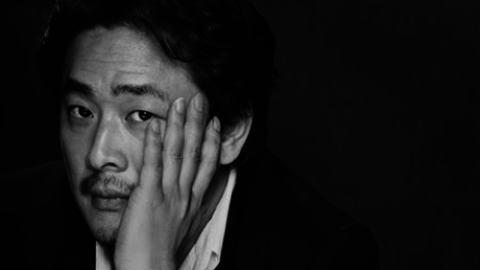Interview: Park Chan-wook
Ever since Park Chan-wook’s 2003 Cannes Grand Prix winner Oldboy—a film that epitomized the New Korean Cinema and turned the hammer-wielding Choi Min-sik into an icon—he has maintained a reputation among his most ardent fans as the master of operatic tales of vengeance and creative expressions of extreme violence. But one important element in his films tends to get overlooked, and that’s his continuing examination of the female psyche—especially in Lady Vengeance (2005), I’m a Cyborg, But That’s OK (2006), Crush and Blush (2008; an underrated black comedy that Park produced and co-wrote for director Lee Kyoung-mi), his English-language debut Stoker (2013), and his new period drama, The Handmaiden, which screened in competition at Cannes last May. While his films couldn’t feel further from being quiet chamber pieces, Park’s focus on female characters and their resilience in the face of the larger societal forces suggest a through-the-looking-glass kinship with Mikio Naruse, one of his favorite filmmakers who was known as a great director of women.
In his films, Naruse effectively examined the impact of modernity on working-class women in mid-20th-century Japan, especially in his frequent collaborations with the legendary actress Hideko Takamine—the character of Lady Hideko in The Handmaiden is named after her. While the setting for Park’s films is primarily the world of late modernity, both his and Naruse’s heroines are not passive observers of their circumstances, but are trying to be in control of their own destiny, staying true to their emotions and following their desires—from finding love to getting revenge—despite the odds. Whether consciously or not, Park ultimately wants us to pay attention to the increased complexity of the roles of women (and men) in society caused by ever-accelerating technological change, be it the modernity of colonial Korea in The Handmaiden, or the late capitalist dystopia of the Vengeance Trilogy.
Set in 1930s Korea under Japanese colonial rule, The Handmaiden is at its core a sensual tale of romance between two women: Lady Hideko (Kim Min-hee), a Japanese noblewoman who lives on a secluded estate belonging to her overbearing Uncle Kouzuki (Cho Jin-woong), and her new Korean maid Sook-hee (Kim Tae-ri), who is secretly plotting with con artist Count Fujiwara (Ha Jung-woo) to defraud Hideko of a large inheritance. Inspired by the Victorian-era lesbian crime tale Fingersmith from Welsh novelist Sarah Waters, the genesis of The Handmaiden was also made possible by two women. First, it was the wife of producer Syd Lim (Oldboy, Crying Fist, The Handmaiden) who read Fingersmith and thought that it would make for a great movie; and second, director Park’s wife encouraged him to follow up Stoker with another female-centric film, while he was contemplating another project.
Film Comment spoke to Park while he was in New York for a mini-retrospective of his films at Metrograph, organized by the Korean Cultural Center, and the U.S. release of The Handmaiden. The interview took place in an evening car ride across town, which reminded the director of Cronenberg’s Cosmopolis.
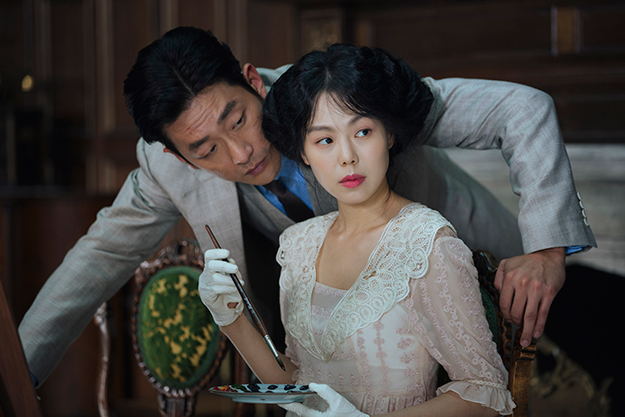
Starting with Lady Vengeance, there has been a shift toward female protagonists in your films. How did this come about?
It’s because in Oldboy, the lead female character, Mi-do [Kang Hye-jung], is somebody who is not privy to the truth. That was something that didn’t sit right with me, even though, as the daughter of Dae-su [Choi Min-sik], she needed to be excluded from the truth by the necessity of the narrative. So as I started to develop Lady Vengeance, I got to think about this a little bit. In the film industry, in the realm of the commercial feature-length films, we really haven’t had a lot of female protagonists. I got to realize this more, as I was getting ready to make Lady Vengeance. And when you place a woman at the center of a film, it makes the film that much more enriched, and it makes it feel much more sophisticated. Also, I have one daughter, and as she grew older, I had more of an opportunity to talk to her. Between my wife and my daughter, I have learned to see the world through more of the female perspective, and I would call that progress—I became more mature as a person.
Do you see The Handmaiden as the culmination of your exploration of female characters?
I wouldn’t exactly call it a culmination, but it’s a movie where I pushed the feminist perspective the most. This film is fundamentally different from my previous films because it’s about two women—it’s not just one woman fighting a lonely battle—but it is two women who find love and form a bond of solidarity. Overall, The Handmaiden is a very simple film. It divides everything into two clear sides, and that’s to make a point. It pits man against woman, almost as a battle of the sexes, and you have the female characters forming an alliance to fight against the male oppressors and escaping from them. In this film, all the men are villains and all the men are pathetic. The only cool characters are women. And the only positive male characters in the film are one or two babies [Laughs].
Lady Hideko and Sook-hee prove superior to the male characters, and there’s a sense that they don’t have any need for men.
Yes, even if that feels like a fairy-tale world—in fact the last scene does feel like that, doesn’t it? With the moon, the ocean, and the clouds, with the colors that I used in the last scene, I wanted to imbue it with that kind of beauty. Even if it’s a fairy tale, I wanted to end on a note where we’re dreaming about this type of idealized world.
The newcomer Kim Tae-ri shines as Hideko’s maid Sook-hee. Can you tell us a bit about the casting process?
We saw around 1470 young women during the audition, but didn’t end up selecting any of them. We just couldn’t find the right actress until the very end. I would like to say one thing about the casting process: if you find yourself in a situation where you are wondering if anyone from the short list is the right person for the role, that probably means that none of them are right. An actor should stand before you and you should immediately feel that the person is right for the role, and this was the case when we cast Kim Tae-ri. We came across her based on a recommendation that was made by one of our producers. At the audition, Kim Tae-ri didn’t seem to be at all concerned about appearing pretty. She did her best, and she gave the performance in her own way, not something that anyone else could’ve done. It’s as if she was saying “this is me, take it or leave it.” Seeing her, I was looking at a very independent and empowered woman.
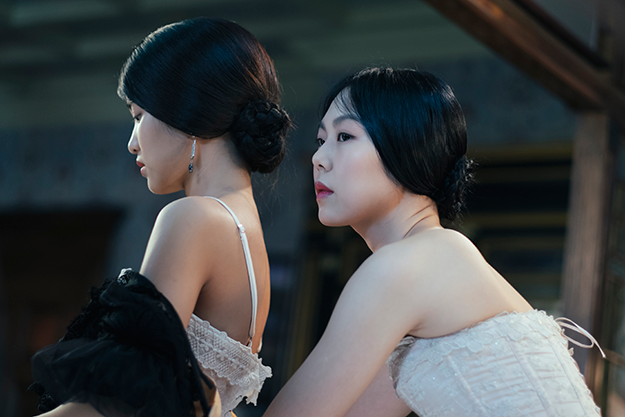
What do you hope that the audience will take away from The Handmaiden?
Everything that I wanted to say with this film is probably in this one scene where the women are jumping over the stone wall—and notice how low this wall is. Had she ever wished, Lady Hideko could’ve always jumped over that wall. But the deep-rooted emotional trauma inside her was holding her back. And then this person [Sook-hee] enters her life and she is able to find love. Through that love, Hideko gains bravery that allows her to jump over that wall, in a single breath, toward freedom.
The male characters also appear trapped. Even though they try to control the women, they are prisoners of their own selfish desires. And since they don’t know how to love, liberation is not possible for them.
Yes, exactly. It’s because of their greed.
There’s a conversation that takes place between the Count and Kouzuki in the library. The Count asks, “Why this urge to become Japanese?” To which Kouzuki replies, “Because Korea is ugly and Japan is beautiful.” What does this exchange tell us about Korea’s historical experience with foreign cultures, particularly when it comes to the Japanese occupation, and even the U.S. influence since the Korean War?
There are those people in Korean society, found among the intellectuals in the upper class, who during the Japanese occupation would worship the Japanese. These days, they could be worshiping the Americans, and some of them might be worshiping the French or the Germans. And above all else, prior to the Japanese occupation, the Koreans have been worshiping the Chinese for hundreds of years, and that’s something that had become part of the conscience of some section of the ruling class and some of the intellectuals of the day. There’s a Korean term, sadaejuui, that is used to uniquely express this notion, where the people of a smaller nation are so drawn to the power of a larger nation, and become subservient to that power. They internalize it so much that they are not worshiping the bigger power by force, but are doing it voluntarily. Through the character of Uncle Kouzuki, I wanted to paint a portrait of these poor, sad, and pathetic individuals—who are poor, I say—but who become a big threat and a serious danger for the other people of their nation.
This also makes for an interesting dynamic between Lady Hideko and Kouzuki.
Uncle Kouzuki is neither Japanese nor a nobleman. Hideko is both Japanese and of noble birth, which is what Kouzuki aspires to. Even though she has raised her from childhood, Kouzuki cannot do what he pleases with Hideko, since he recognizes that she is inherently superior to him by birth, because of the values that he holds dear. And this also affects Kouzuki’s relationship with Count Fujiwara. Kouzuki is deceived so completely by the Count, because he thinks that he is Japanese and of noble birth, and he’s simply unable to suspect him of any wrongdoing.
I may be reading too much into it, but if we look at this simplified battle between a man and a woman in symbolic terms, we could say that Korea represents the female and that the occupying foreign influence represents the male.
I can see why you feel that may be the case, and that sort of dynamic is organically created, but it’s not something that I consciously intended.
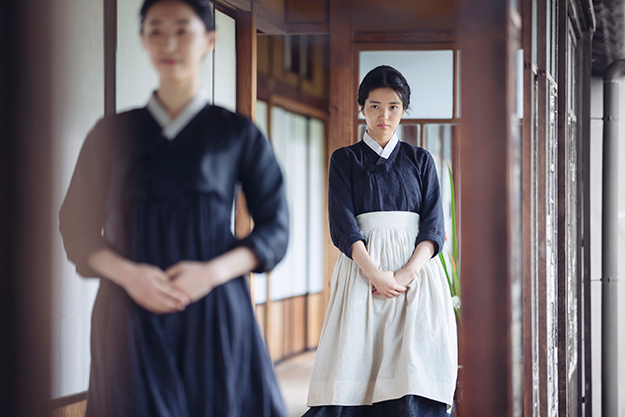
Fingersmith is set in Victorian England. Why did you choose to move it to the 1930s Korea during the Japanese rule?
I found out that the BBC had already made a miniseries based on Fingersmith, and because there was a preexisting work, I didn’t want to follow in its footsteps and also set the film in Victorian England. So producer Syd Lim came up with the idea that we move the setting to 1930s Korea, since it was also a period of transition, as the country was going through modernization.
Lim mentioned how he came across Oldboy manga, which served as the source material for your landmark film, when he was bored and visited a comic book shop. How important is boredom and leisure time for the creative process?
It is very important. That kind of free time, idle time, is essential for the people in this industry. However, the more experience you have, and the further in your career you get, there are far less opportunities for leisure. So we have to fight to somehow obtain that sort of idle, free time. In the old days, it used to be that a director would make a movie, and that would be it. But nowadays, you can’t expect that. It was probably when Hitchcock became a bit of a star director that this kind of tradition was established, where directors are also expected to be actively engaged in promoting the film, to give interviews and talk about their films. All of these activities cut into your free time.
And I get the sense that you don’t like talking about your films that much?
That’s the only thing about being a film director that is difficult for me. As a film director, I get asked those kinds of questions—“Oh Park, what was the most difficult thing that you had to contend with during the screenwriting stage or during the process of directing this film?”—and I would always say that nothing was difficult; I enjoy every step of the process, I enjoy every aspect, every facet of it. If there is one thing that I find difficult, it is this—promotion.
You are known as an avid reader. How important do you think reading and exposure to literature are for aspiring filmmakers?
The way I see it, only a handful of filmmakers from each generation join the pantheon of the masters. Out of all the young filmmakers out there, only a handful will be remembered as greats in the future, so maybe only a handful of those young filmmakers are doing a lot of reading—who knows?
What are you currently reading?
Émile Zola’s La Bête humaine—I have almost finished reading it. It is scary good! So good that I can’t figure out why I’m only reading it now. After Thérèse Raquin [upon which Thirst (2009) was loosely based], I’m thinking, do I have to do another film inspired by Émile Zola?
You worked as a film critic in the 1990s. Do you miss writing about film?
Not at all! That work is something that can be very important and can be fun. But for me, the work was the one I did to put bread on the table for my family. So I only have memories of it being a burden and a lot of work. You see the predicament: I want to be making my films, but here I am spending all my time watching other people’s films and analyzing them.
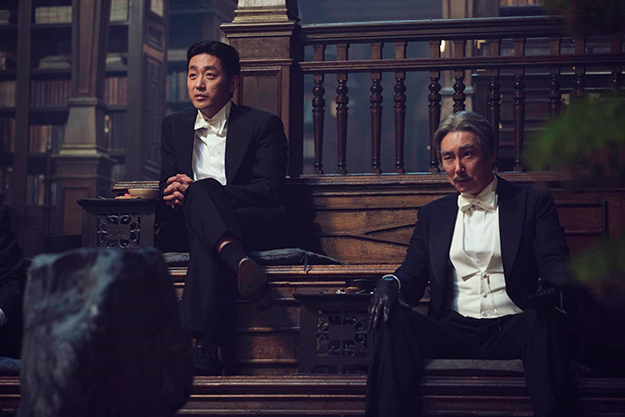
It’s been mentioned on many occasions that seeing Hitchcock’s Vertigo made you decide to become a film director. Who are some other filmmakers that have inspired you and influenced your work?
I’m not sure about other people, but for me, I don’t watch any movie more than once. I’m not the type of person who plays a movie, replays a scene over and over again in order to analyze how the scene was structured, how the shot was composed. I don’t do that. I don’t study film when I watch film. I’m actually not sure how much influence I get from filmmakers whose works I like, because I even forgot about the films of theirs that I have watched in the past. Under that caveat, Yasuzo Masumura is a film director whose films never cease to amaze me. He has had a very interesting career. He went to Tokyo University law school, meaning that he’s from the elite. Yet his films don’t feel at all like they were made by someone from the elite. It’s more like they were made by a crazy, eccentric person! The other filmmaker that I really like is Mikio Naruse. You might get the feeling that his films are on the opposite end of the spectrum when compared to my films, but I feel inexplicably drawn to them. His films have such power that I broke my rule and have watched his films twice, three times! [Laughs]
What ambitions do you still have as a filmmaker? Things you still want to accomplish, certain stories that you want to tell?
A lot! I would like to make better films, the kind of films that will stay in people’s memory for a long time. And the kinds of films that would be screened at cinematheques time and time again, and people would revisit them on Blu-rays, and what have you. In terms of genres, I’d love to try my hand at a Western, sci-fi movie, spy movie, musical… I haven’t done any of those yet.
So what’s going to be next?
Not sure. There are a number of projects that I am developing, but I don’t even know yet if my next film is going to be in English or Korean.
Goran Topalovic is a New Jersey–based film curator and writer. He’s the co-founder of Subway Cinema and the New York Asian Film Festival.



